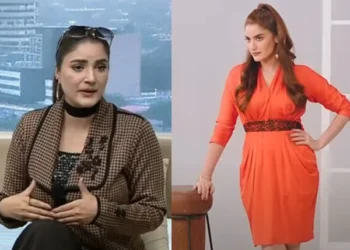Introduction: Social Media Misinformation Targets Pakistani Actress
In the era of viral content and instant news, public figures often become victims of false narratives. Recently, Pakistani actress Momina Iqbal found herself at the center of a fabricated controversy involving her gender identity, which has now drawn widespread attention on social media.
In a bold and emotional statement, Momina Iqbal has categorically denied baseless rumors claiming she is transgender, calling out the deliberate manipulation of her past interview to spread false information. The incident has not only affected her emotionally but has also sparked conversations about cyberbullying, misinformation, and respect for personal identity in Pakistan’s entertainment industry.
Viral Clip from 2022 Interview Misrepresented
The controversy began when a video clip from a past interview Momina gave in August 2022 resurfaced on social media. However, this time, the clip was edited and twisted out of context, giving the false impression that Momina had disclosed being transgender.
The manipulated video quickly went viral, garnering over 45 million views, and triggered a wave of rumors and misunderstanding about her gender identity. Instead of investigating the source or verifying facts, many social media users began sharing, commenting, and speculating, contributing to the firestorm of misinformation.
Momina Iqbal Reacts: “Painful to Question a Woman’s Identity”
In a recent interview with a private TV channel, Momina addressed the issue head-on, expressing her pain and frustration over the incident.
“After this video started circulating, I received calls from multiple reporters. I didn’t know how to respond. It’s incredibly painful when someone questions a girl’s gender identity,” she said.
The actress shared that during the initial days of the video going viral, she was advised by several people to issue a clarification, but she was hesitant.
“I was told to speak up and clear my name, but I kept wondering, ‘How can I justify something that is not true?’ If what was being said about me were true, I would have owned it, but since there is no truth to it, why should I explain a lie?” she stated.
Her dignified and composed response to this sensitive issue earned her widespread praise from fellow actors, fans, and human rights advocates.
The Dangers of Deepfakes and Video Manipulation
The video in question was not just misunderstood — it was edited maliciously, an act that highlights the growing threat of deepfakes and manipulated content in the digital age.
With advancing technology, it has become increasingly easy for users to edit videos and spread disinformation. Public figures like Momina Iqbal are particularly vulnerable targets, and once a fake video goes viral, the damage to reputation and emotional well-being can be irreversible.
This incident has ignited debate about the need for stricter regulations and cyber laws in Pakistan to tackle digital crimes, especially those involving character assassination and gender-based misinformation.
Momina Iqbal: Rising Star of the Pakistani Drama Industry
Amid this controversy, it is essential to remember who Momina Iqbal really is — a respected and rapidly rising actress in the Pakistani drama industry.
Momina began her acting career in 2018 and quickly earned recognition for her natural talent, screen presence, and versatility. Some of her most popular dramas include:
- “Ehd-e-Wafa”
- “Khuda Aur Mohabbat”
- “Mera Rab Waris”
- “Ishq Mein Kaafir”
- “Grift”
In each of these roles, she has captivated audiences with her authentic performances, earning both critical acclaim and fan admiration.
Her success story is one of hard work, dedication, and perseverance in a highly competitive industry. The recent fake news attempt to malign her personal identity has shocked many in the industry and sparked outrage among her fans.
Industry Reactions and Public Support
After the video started circulating and Momina’s clarification went public, many celebrities, fans, and social media influencers voiced their support.
Actors and Directors Speak Out
Prominent names from the drama industry like Ahsan Khan, Ushna Shah, and Iqra Aziz condemned the fake video and applauded Momina for handling the situation with grace.
“No one should ever be made to justify their identity because of a cheap viral clip. Momina Iqbal, we are with you,” wrote one celebrity on Instagram.
Fans Launch Hashtag Campaigns
Fans also started hashtags like:
- #WeSupportMomina
- #StopCyberBullying
- #RespectArtists
The comments sections of Momina’s social media posts were flooded with messages of love and solidarity, reaffirming her place as a beloved public figure.
Cyber Harassment and Women in Pakistani Media
This incident also highlights the wider issue of cyber harassment against women in Pakistan. Female celebrities, journalists, and influencers frequently face online abuse, ranging from character attacks to invasive questioning about their personal lives.
Despite legal frameworks like the Prevention of Electronic Crimes Act (PECA), enforcement remains weak. Victims often find it difficult to seek redress due to lack of evidence, slow judicial processes, and public shaming.
Momina Iqbal’s case is a wake-up call for regulators and lawmakers to revisit the policies governing digital safety and to introduce stronger protection for women online.
Momina’s Message to the Public and Media
In her concluding remarks, Momina urged the public and media houses to be more responsible and sensitive, especially when discussing personal matters.
“I have nothing to hide. But we should be careful about what we say and share. Misinformation can destroy lives,” she emphasized.
Her firm stance sends an important message: truth must always be protected, and no one should be forced to defend themselves against lies for the sake of online engagement.
Conclusion: A Call for Respect, Truth, and Accountability
Momina Iqbal’s response to a fabricated social media attack shows strength, courage, and wisdom. While the video may have been created to tarnish her reputation, her dignified rebuttal has only enhanced her stature in the eyes of the public.
This incident underscores the urgent need for awareness, digital literacy, and responsible social media behavior. As more public figures face cyber harassment, Pakistan must move toward a culture of respect, consent, and truth—online and offline.
The entertainment industry, civil society, and the government must work together to protect the dignity and rights of individuals, ensuring that no one else has to suffer what Momina went through simply for being a woman in the public eye.

























